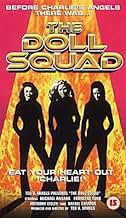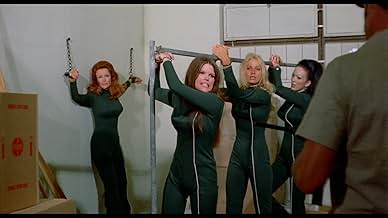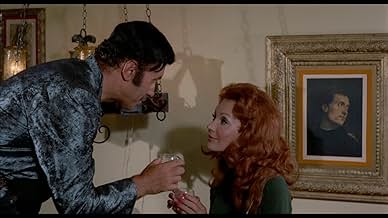IMDb RATING
4.4/10
1.2K
YOUR RATING
Squad of beautiful government agents tries to catch saboteurs.Squad of beautiful government agents tries to catch saboteurs.Squad of beautiful government agents tries to catch saboteurs.
Herb Robins
- Munson
- (as Herb Robbins)
Gustaf Unger
- Dr. Cahaymen
- (as Gustave Unger)
- Director
- Writers
- All cast & crew
- Production, box office & more at IMDbPro
Storyline
Did you know
- TriviaIt is speculated that Aaron Spelling got the idea for Charlie's Angels (1976) after attending the premier of this film.
- GoofsThe finale of the film supposedly takes place on a remote island off the coast of South America, yet the vehicles driven by the bad guys bear Montana license plates.
- Alternate versionsThe film was originally shown in two versions, both possibly uncut, with different posters aiming at different markets: The Doll Squad, rated PG, distributed by Geneni Film; and Seduce and Destroy, rated R, by Dinero Productions.
- ConnectionsFeatured in The Wild World of Ted V. Mikels (2008)
Featured review
Ted V Mikels is a kitsch director whose best work rises above practical efforts at criticism. He produced the films most highly regarded amongst a coterie of fans over just few years: The Astro Zombies' (1969), The Corpse Grinders' (1972), and Blood Orgy of The She Devils' (1972), each have their following and have endured on video. As the last of Mikel's trash favourites to appear, 'The Doll Squad' contains the least horror and fantasy and, in comparison to it's predecessors, adheres more closely to a logical dramatic structure. Since then, although he had remained active - most recently with Dimension of Fear' (1998) - Mikels has produced nothing else regarded by fans with such long-lived affection. Firmly in the realms of so-bad-it's-good, the years have added an enjoyable sheen to The Doll Squad', particularly now that it can be taken with the gloss of post-modern irony.
This is the film whose central premise - Mikels allegedly claimed - was ripped off by producer Aron Spelling to become the television series Charlie's Angels'. No doubt the reissue of Doll Squad' has also been at least in part inspired by the commercial success and marketing of the big screen version of that programme. Comparison of Mikels' film with Spelling's work does reveal similarities. But nothing in the TV Charlie's Angels', or the recent Hollywood outing compares to Mikel's wide-eyed glance at the genre, the cheesy pulchritude on display and his disregard for dramatic standards.
The Doll Squad is selected for assignment by computer, after it picks up 'something in O'Riley's personality which means experienced women should do the job' of stopping him. 'Experience' in this context naturally implies more than just familiarity with tough assignments. The squad of Sabrina, Liz, Sharon, Lavelle and Kim hail from different backgrounds, including a librarian, a scientist, karate instructor and, most noticeably, erotic dancer (played by Tura Satana, the Apache-Japanese better known for her role in Russ Meyer's far more provocative 'Faster Pussy Cat, Kill Kill!' (1965)).
It might be argued that, as a group of strong assertive women, the Doll Squad is a model of feminine self-reliance. After all, they are empowered to find and stop the villainous O'Riley by a senator, and are allowed complete independence and licence for the duration of their mission. But their assertiveness is essentially apolitical and, except for their expected impact on the criminal community, always non-threatening and contained within fantasy. The choice of squad personnel, obviously intended as a cross section of female society, merely emphasises a common voluptuousness. In tandem with the women's physical stamina, Mikel creates through this all-too familiar trash archetypes
Leaving aside its relationship to 'Charlie's Angels', the most striking element of Mikels' film is its flat playfulness. Like most favourite cult trash directors, he is cheerfully oblivious to the handicaps of abilities and material. For the viewer, of course this is part of the fun. It would be pointless here to refer in detail to the fluffed lines, one-dimensional plot and rudimentary cutting and pacing. Instead, a viewer best engages with the film on a naïve level, such (presumably) as the director/producer/co writer did, or by assuming a knowing camp sophistication. There's more than a degree of that to be found in the flame-thrower cigarette lighter, for instance, the lame kung fu, or the exploding poison. These days The Doll Squad' is more likely to leave the knowing viewer with a wink than a grimace, as it plays its simple variation on the espionage thriller. As a z-grade auteur, Mikels, resolutely goes his own way in the film, immune to the strictures of any responsible' judgement, incidentally striking a chord with the modern viewer which he could hardly had anticipated at the time.
However one approaches the film, it still has the distinct straight-faced charm which has kept it a favourite down the years. Helped by a surprisingly strong musical score, and photographed competantly, The Doll Squad', beehive hair cuts and cheesy décor intact, has dated pleasantly and remains a guilty pleasure.
This is the film whose central premise - Mikels allegedly claimed - was ripped off by producer Aron Spelling to become the television series Charlie's Angels'. No doubt the reissue of Doll Squad' has also been at least in part inspired by the commercial success and marketing of the big screen version of that programme. Comparison of Mikels' film with Spelling's work does reveal similarities. But nothing in the TV Charlie's Angels', or the recent Hollywood outing compares to Mikel's wide-eyed glance at the genre, the cheesy pulchritude on display and his disregard for dramatic standards.
The Doll Squad is selected for assignment by computer, after it picks up 'something in O'Riley's personality which means experienced women should do the job' of stopping him. 'Experience' in this context naturally implies more than just familiarity with tough assignments. The squad of Sabrina, Liz, Sharon, Lavelle and Kim hail from different backgrounds, including a librarian, a scientist, karate instructor and, most noticeably, erotic dancer (played by Tura Satana, the Apache-Japanese better known for her role in Russ Meyer's far more provocative 'Faster Pussy Cat, Kill Kill!' (1965)).
It might be argued that, as a group of strong assertive women, the Doll Squad is a model of feminine self-reliance. After all, they are empowered to find and stop the villainous O'Riley by a senator, and are allowed complete independence and licence for the duration of their mission. But their assertiveness is essentially apolitical and, except for their expected impact on the criminal community, always non-threatening and contained within fantasy. The choice of squad personnel, obviously intended as a cross section of female society, merely emphasises a common voluptuousness. In tandem with the women's physical stamina, Mikel creates through this all-too familiar trash archetypes
Leaving aside its relationship to 'Charlie's Angels', the most striking element of Mikels' film is its flat playfulness. Like most favourite cult trash directors, he is cheerfully oblivious to the handicaps of abilities and material. For the viewer, of course this is part of the fun. It would be pointless here to refer in detail to the fluffed lines, one-dimensional plot and rudimentary cutting and pacing. Instead, a viewer best engages with the film on a naïve level, such (presumably) as the director/producer/co writer did, or by assuming a knowing camp sophistication. There's more than a degree of that to be found in the flame-thrower cigarette lighter, for instance, the lame kung fu, or the exploding poison. These days The Doll Squad' is more likely to leave the knowing viewer with a wink than a grimace, as it plays its simple variation on the espionage thriller. As a z-grade auteur, Mikels, resolutely goes his own way in the film, immune to the strictures of any responsible' judgement, incidentally striking a chord with the modern viewer which he could hardly had anticipated at the time.
However one approaches the film, it still has the distinct straight-faced charm which has kept it a favourite down the years. Helped by a surprisingly strong musical score, and photographed competantly, The Doll Squad', beehive hair cuts and cheesy décor intact, has dated pleasantly and remains a guilty pleasure.
- FilmFlaneur
- Jul 11, 2001
- Permalink
- How long is The Doll Squad?Powered by Alexa
Details
- Release date
- Country of origin
- Language
- Also known as
- Female Mercenaries
- Filming locations
- Glendale, California, USA(Compound)
- Production company
- See more company credits at IMDbPro
Contribute to this page
Suggest an edit or add missing content

















